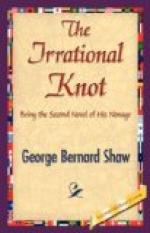“To transfer it to my own, you mean. Thank you, Mr. Lind. The public is more accustomed to associate conjugal levity with the name of Lind than with that of Douglas.”
“If you refuse me the justice you owe to my daughter, you need not couple that refusal with an insult.”
“I have already explained that I owe your daughter nothing. You come here and offer me ten thousand pounds to marry her. I decline the bargain. You then take your stand upon the injury to your name. I merely remind you that your name was somewhat tarnished even before Mrs. Conolly changed it for the less distinguished one which she has really dishonored.”
“Douglas,” said Mr. Lind, trembling, “I will make you repent this. I will have satisfaction.”
“As you remarked when I declared my readiness to give satisfaction in the proper quarter, the practice you allude to is obsolete. Fortunately so, I think, in our case.”
“You are a coward, sir.” Douglas rang the bell. “I will expose you in every club in London.”
“Shew this gentleman out,” said Douglas to his servant.
“You have received that order because I told your master that he is a rascal,” said Mr. Lind to the man. “I shall say the same thing to every man I meet between this house and the committee-room of his club.”
The servant looked grave as Mr. Lind left the room. Soon after, Douglas, whose self-respect, annihilated by Conolly, had at first been thoroughly restored by Mr. Lind, felt upset again by the conclusion of the interview. Finding solitude and idleness intolerable, he went into the streets, though he no longer felt any desire to meet his acquaintances, and twice crossed the Haymarket to avoid them. As he strolled about, thinking of all that had been said to him that afternoon, he grew morose. Twice he calculated his expenditure on the American trip, and the difference that an increment of ten thousand pounds would make in his property. Suddenly, in turning out of Air Street into Piccadilly, he found himself face to face with Lord Carbury.
“How do you do?” said the latter pleasantly, but without the unceremonious fellowship that had formerly existed between them.
“Thank you,” said Douglas, “I am quite well.”
A pause followed, Jasper not knowing exactly what to say next.
“I am considering where I shall dine,” said Douglas. “Have you dined yet?”
“No. I promised to dine at home this evening. My mother likes to have a family dinner occasionally.”
Douglas knew that before the elopement he would have been asked to join the party. “I suppose people have been pleased to talk a good deal about me of late,” he said.
“Yes, I fear so. However, I hope it will pass over.”
“It shews no sign of passing over as yet, then?”
“Well, it has become a little stale as a topic; but there is undeniably a good deal of feeling about it still. If you will excuse my saying so, I think that perhaps you would do well to keep out of the way a little longer.”




